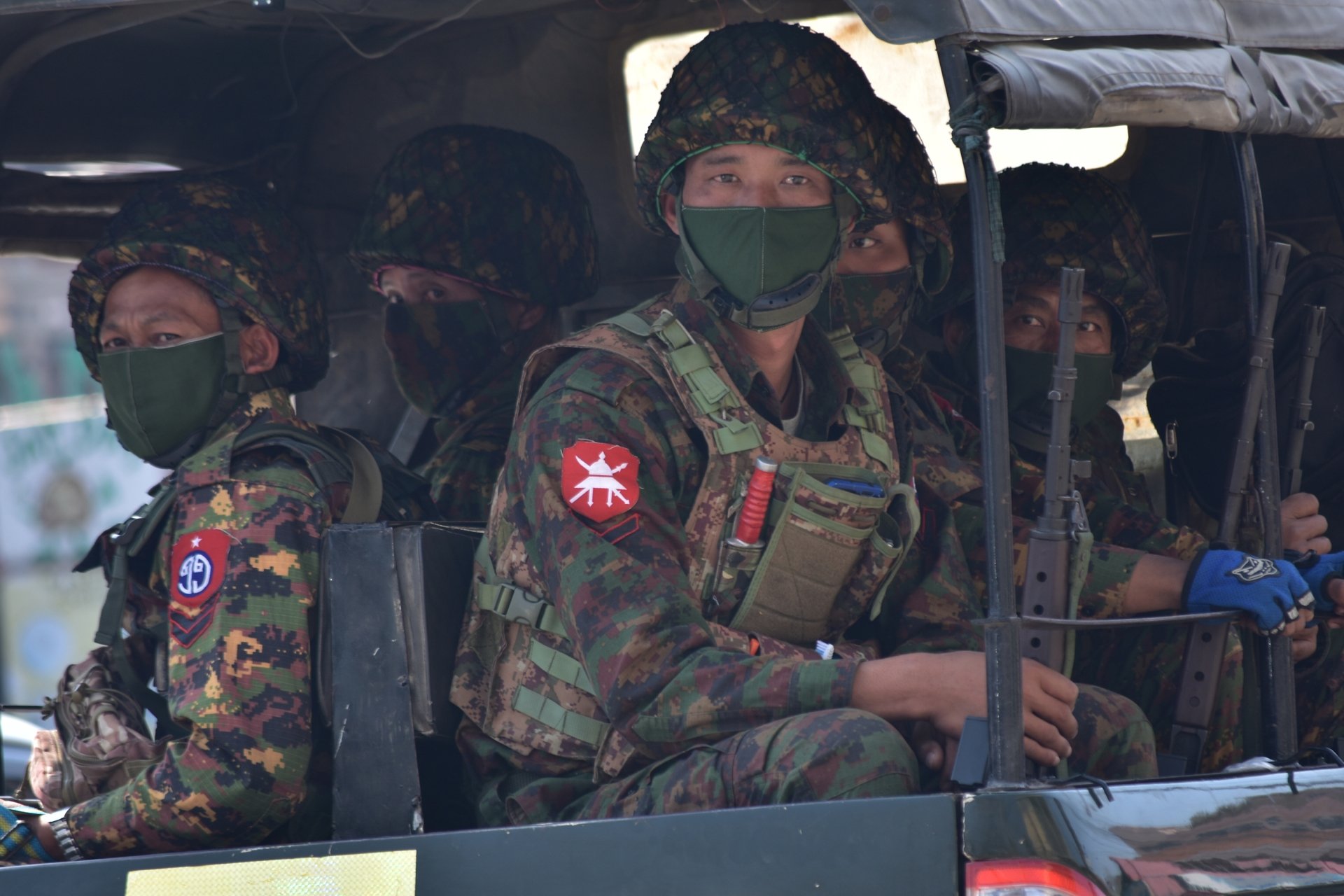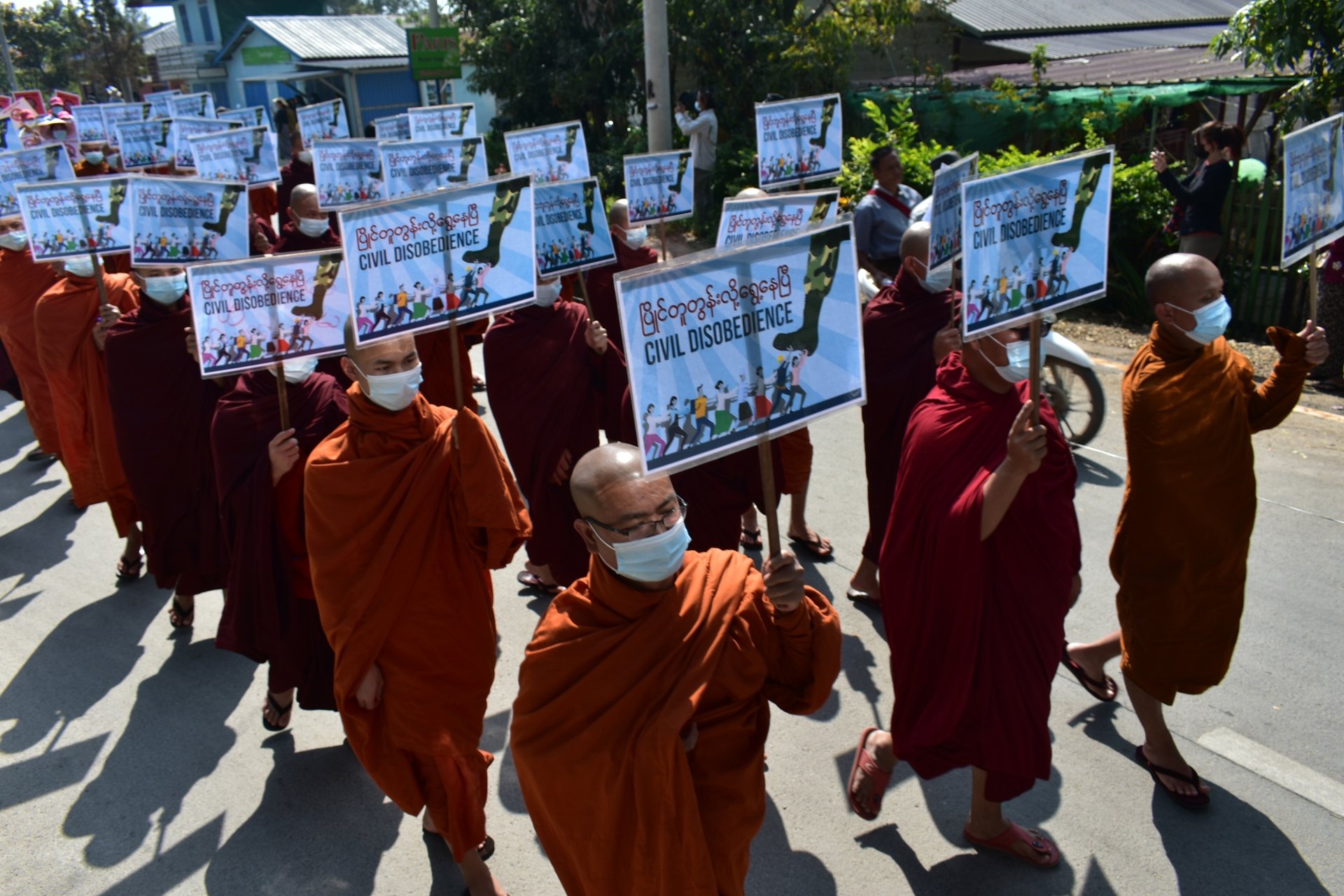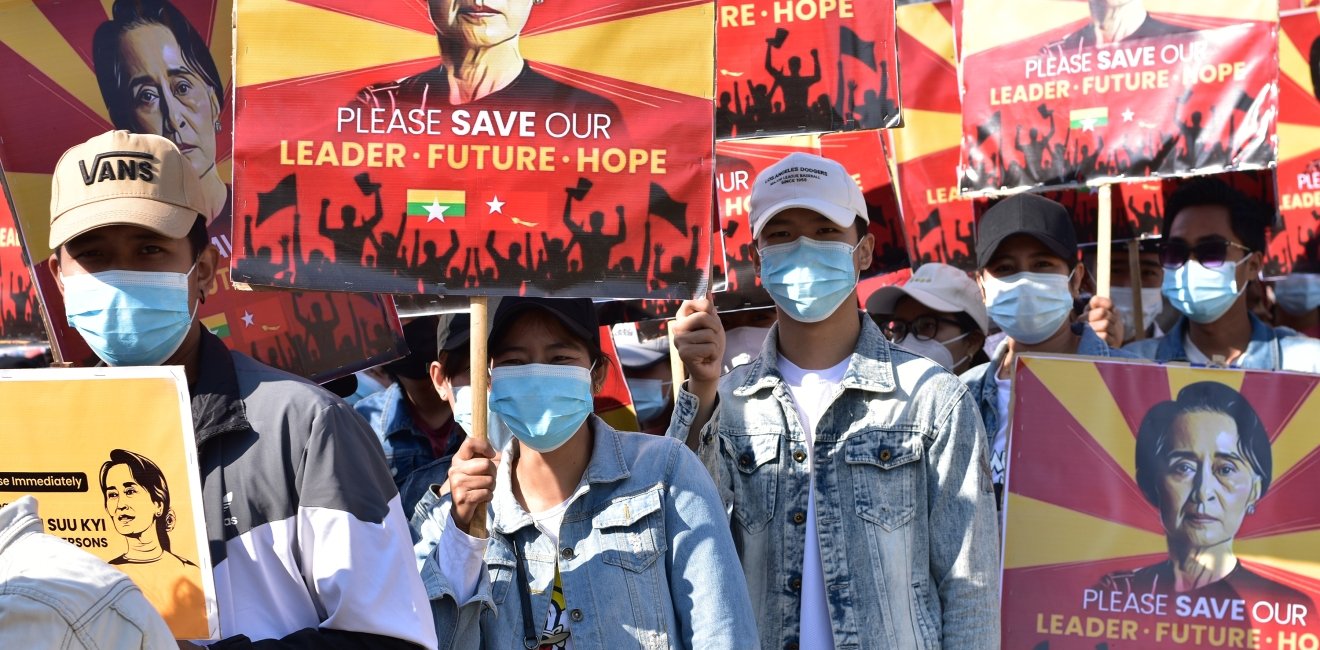
A blog of the Indo-Pacific Program
The events in Myanmar, or Burma, have taken an ominous, but predictable, turn with indiscriminate live fire by security forces against unarmed protestors. Yet the demonstrations continue. They are united in resistance in the face of a military takeover and a demand that the democratically-elected government led by the National League for Democracy and Aung San Suu Kyi — be restored. The demonstrations that began with students have grown to include nearly the whole of society except the police and the military.
All of this is a reaction to the decision by the Commanding Officer of the Tatmadaw (armed forces), Sr. Gen. Min Aung Hlaing, to abrogate the results of recent national elections and imprison the civilian politicians who won that election. The General claimed that the results of the election were tainted by “fraud” — a claim flatly rejected by the National Election Commission. The General responded to the burgeoning protests by calling upon the populace to be more “disciplined” and stop being misled by “unscrupulous agitators.” It isn’t working. Every day the crowds grow larger and the pressure on the junta mounts. All of this carries strong echoes from Myanmar/Burma’s recent past — and that past was bloody.
British colonial rule in Burma ended in 1947, and the newly independent republic adopted all the trappings of British Westminster democracy. It was not long, however, before the army, impatient with what it thought was weak civilian leadership, took over in a coup. For the 26 years between 1962 and 1988, the army ran Burma. In economic terms, they ran it into the ground. Their “Burmese Road to Socialism” took a naturally wealthy country and impoverished it. The combination of dictatorship and privation produced growing discontent. Popular anger boiled over in 1988 when students went into the streets demanding an end to military rule. The army’s response was brutal and bloody; thousands were killed or driven into political exile.
However, the regime seemed to take a lesson from these events. In 1990, the junta announced democratic elections for a new government. The generals were confident that they had rigged the system so it would produce an electoral victory for pro-military candidates. Then something truly remarkable happened. Burma’s national independence hero, Gen. Aung San, had died at the hands of an assassin on the eve of independence. He left behind his widow and two year-old daughter, Aung San Suu Kyi. The widow and daughter moved to Britain, but in 1990, Suu Kyi returned to Burma for the first time in order to care for her ailing mother who had returned home to die.
The 1990 election campaign generated great excitement with huge political rallies in the capital, Yangon (Rangoon). Then people discovered that Aung San’s daughter was living there in their midst, at her father’s old home. Crowds soon gathered outside her gate imploring her to appear and speak. Suu Kyi quickly discovered she had her father's gift to command attention and to lead. She was catapulted into the leadership of the hastily organized civilian political movement — the National League for Democracy (NLD). The NLD won the ensuing election by a landslide. The army responded by declaring the election invalid and arresting and imprisoning the NLD leadership. Suu Kyi was placed under house arrest.

For the next 30 years, Burma (now renamed Myanmar) remained frozen in time — military rule, political prisoners, human rights abuses, and economic stasis. Myanmar became an international pariah and Aung San Suu Kyi became an icon of democracy — awarded the Nobel Prize while still under confinement.
Then, in 2010, the generals relented (at least partly) and announced that civilian political parties could contest elections under a new constitution. Suu Kyi was released and allowed to resume leadership of a revived NLD. Once again, the generals thought they had rigged the system to guarantee that their interests, including constitutional provisions giving the military a veto over legislation, would be protected. But the NLD won the 2015 elections and Suu Kyi emerged as the de facto president.
Despite this record of miscalculation, the commander of the armed forces, Gen. Hlaing, clearly expected that pro-military parties would do very well in the November 2020 elections. Instead, the results again repudiated the military parties and reaffirmed broad popular support of the NLD led by Aung San Suu Kyi. An angry, frustrated military commander responded true to type — he abrogated the results and declared martial law.
To the outside observer, Gen. Hlaing’s coup seems irrational in the extreme. The Tatmadaw already enjoyed an immensely privileged position with a constitution designed to protect its power and wealth. No one outside the coup leadership knows what exactly triggered the coup, but several factors seem to have come together.
First, the Tatmadaw is a kind of state within a state — headquartered in a purpose-built capital city carved out of the jungle and largely isolated from the bulk of the population. The military culture is one of unquestioned obedience to authority. Gen. Hlaing almost certainly expected the citizenry to accept the coup and obey his commands. Instead, he has a popular uprising on his hands.
Second, there are ample indications of increasingly strained relations between Gen. Hlaing and Aung San Suu Kyi. Aung San Suu Kyi has apparently been lobbying to amend the constitution to remove the Tatmadaw’s veto. For Gen. Hlaing, that constituted a direct threat to the power and extensive economic holdings of the armed forces.
Third, Tatmadaw commanders have a history of dramatically overestimating popular support for the military. They expected political parties aligned with the armed forces would easily win the 1990 elections. They made a similar assumption in advance of the 2012, 2015 and 2020 elections. Gen. Hlaing seems to have expected the military political parties to do so well in the 2020 contest that they would be able to install him as Myanmar’s president. That, in turn, would enable him to protect extensive family business holdings. The bitter surprise of the actual vote plus deep personal animus toward Aung San Suu Kyi seems the most plausible explanation for the coup.
International reaction has been swift. The Biden administration announced targeted sanctions and asset seizures while condemning the military takeover — with more sanctions in prospect. The European Union is expected to follow suit. The G-7 group of advanced countries called for the immediate restoration of democracy — as has the UN Security Council. The coup poses a difficult dilemma for Myanmar’s regional neighbors. Traditionally, the Association of Southeast Asian Nations operates according to a “noninterference” principle. What happens within a country is no one else’s business. But not always. ASEAN foreign ministers will meet in special session on Tuesday and already several member governments have called for the release of Aung San Suu Kyi and her colleagues.
But the most consequential foreign actor is China. U.S.-led sanctions after the 1990 coup had the effect of pushing the Tatmadaw toward China — its only reliable source of economic, military, and diplomatic support. The Biden administration seems very aware of the danger that renewed sanctions will have the same effect. Washington’s policy toward Myanmar in the weeks and months ahead promises to be a very tricky enterprise. The situation is made more interesting and complicated by the fact that the generals in Myanmar don’t particularly like or trust Beijing. [This became clear in past conversations this writer had with Tatmadaw intelligence officers]. Gen. Hlaing’s first statement of his foreign policy priorities included relations with neighboring Laos and Thailand, but no mention of China.

In the meantime, the situation in Myanmar is becoming more ominous. From all indications, the opposition to the coup is broad-based and resolutely determined. Young demonstrators talk openly about forcing the Tatmadaw to back down. At the same time, the culture and history of the Myanmar military points in only one direction — backing down is unthinkable. In 1988 and 1990, and again in 2007, the Tatmadaw enforced its will with lethal effect on protestors. The 2007 “Saffron Revolution” was particularly telling because uniformed soldiers opened fire on protesting monks in the streets of the capital. Monks have a revered place in the majority Burman population — but that did not stay the Tatmadaw’s hand.
If past is prologue, Myanmar is headed toward a bloody domestic showdown. This time the resistance in the streets will be larger than ever before. And all of it will play out in front of a regional and international audience despite regime efforts to censor the press and digital media. It is a grim prospect.
However, there is one X factor in this situation and it concerns the loyalty and reliability of the foot soldiers (and perhaps some officers) in the Tatmadaw. In 1988, the Tatmadaw used military units from the border areas to suppress the students. It suggested some doubt whether troops based in the capital would have been willing to kill students there. [A similar dynamic played out in the Chinese leadership’s bloody suppression of the 1989 Tiananmen demonstrations]. This time the demonstrations are very widespread. Also, the magnitude of the NLD’s election victory indicates that a significant number of rank-and-file soldiers voted in its favor. It is conceivable that the Tatmadaw will be restrained by the fear that individual soldiers and even whole units may break ranks. We haven’t seen it yet, but the possibility remains. This will be particularly true if the impression spreads that this is all about Gen. Hlaing’s personal ambitions and wealth.
Follow the Asia Program on Twitter @AsiaProgram. or join us on Facebook.
The views expressed are the author's alone, and do not represent the views of the U.S. Government or the Wilson Center. Copyright 2020, Asia Program. All rights reserved.
Author

Adjunct Professor, Johns Hopkins University; Former Professor of National Security Policy, National War College and Deputy Staff Director, Senate Select Committee on Intelligence

Indo-Pacific Program
The Indo-Pacific Program promotes policy debate and intellectual discussions on US interests in the Asia-Pacific as well as political, economic, security, and social issues relating to the world’s most populous and economically dynamic region. Read more





